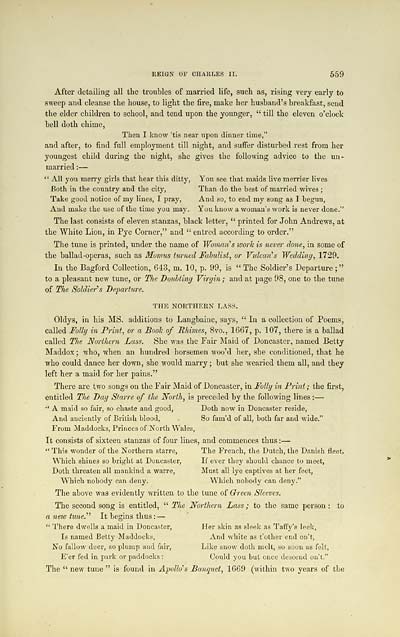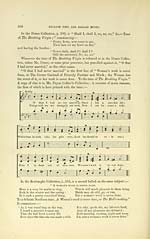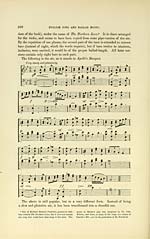Glen Collection of printed music > Printed text > Popular music of the olden time > Volume 2
(183) Page 559 - Northern lass
Download files
Complete book:
Individual page:
Thumbnail gallery: Grid view | List view

REIGN OF CHARLES II. 559
After detailing all the troubles of married life, such, as, rising very early to
sweep and cleanse the house, to light the fire, make her husband's breakfast, send
the elder children to school, and tend upon the younger, " till the eleven o'clock
bell doth chime,
Then I know 'tis near upon dinner time,"
and after, to find full employment till night, and suffer disturbed rest from her
youngest child during the night, she gives the following advice to the un-
married : —
" All you merry girls that hear this ditty, You see that maids live merrier lives
Both in the country and the city, Than do the best of married wives ;
Take good notice of my lines, I pray, And so, to end my song as I begun,
And make the use of the time you may. You know a woman's work is never done."
The last consists of eleven stanzas, black letter, " printed for John Andrews, at
the White Lion, in Pye Corner," and " entred according to order."
The tune is printed, under the name of Woman's work is never done, in some of
the ballad-operas, such as Mom/us turned Fabulist, or Vulcan's Wedding, 1729.
In the Bagford Collection, 643, m. 10, p. 99, is " The Soldier's Departure ;"
to a pleasant new tune, or The Doubting Virgin ; and at page 98, one to the tune
of The Soldier'' s Departure.
THE NORTHERN LASS.
Oldys, in his MS. additions to Langbaine, says, " In a collection of Poems,
called Folly in Print, or a Book of Rhimes, 8vo., 1667, p. 107, there is a ballad
called The Northern Lass. She was the Fair Maid of Doncaster, named Betty
Maddox ; who, when an hundred horsemen woo'd her, she conditioned, that he
who could dance her down, she would marry; but she wearied them all, and they
left her a maid for her pains."
There are two songs on the Fair Maid of Doncaster, in Folly in Print; the first,
entitled The Day Starre of the North, is preceded by the following lines : —
" A maid so fair, so chaste and good, Doth now in Doncaster reside,
And anciently of British blood, So fam'd of all, both far and wide."
From Maddocks, Princes of North Wales,
It consists of sixteen stanzas of four lines, and commences thus : —
" This wonder of the Northern starre, The French, the Dutch, the Danish fleet,
Which shines so bright at Doncaster, If ever they should chance to meet,
Doth threaten all mankind a warre, Must all lye captives at her feet,
Which nobody can deny. Which nobody can deny."
The above was evidently written to the tune of Green Sleeves.
The second song is entitled, " The Northern Lass ; to the same person : to
a new tune." It begins thus : —
" There dwells a maid in Doncaster, Her skin as sleek as Taffy's leek,
Is named Betty Maddocks, And white as t'other end on't,
No fallow deer, so plump and fair, Like snow doth melt, so soon as felt,
E'er fed in park or paddocks : Could you but once descend on't."
The " new tune " is found in Apollo's Banquet, 1669 (within two years of the
After detailing all the troubles of married life, such, as, rising very early to
sweep and cleanse the house, to light the fire, make her husband's breakfast, send
the elder children to school, and tend upon the younger, " till the eleven o'clock
bell doth chime,
Then I know 'tis near upon dinner time,"
and after, to find full employment till night, and suffer disturbed rest from her
youngest child during the night, she gives the following advice to the un-
married : —
" All you merry girls that hear this ditty, You see that maids live merrier lives
Both in the country and the city, Than do the best of married wives ;
Take good notice of my lines, I pray, And so, to end my song as I begun,
And make the use of the time you may. You know a woman's work is never done."
The last consists of eleven stanzas, black letter, " printed for John Andrews, at
the White Lion, in Pye Corner," and " entred according to order."
The tune is printed, under the name of Woman's work is never done, in some of
the ballad-operas, such as Mom/us turned Fabulist, or Vulcan's Wedding, 1729.
In the Bagford Collection, 643, m. 10, p. 99, is " The Soldier's Departure ;"
to a pleasant new tune, or The Doubting Virgin ; and at page 98, one to the tune
of The Soldier'' s Departure.
THE NORTHERN LASS.
Oldys, in his MS. additions to Langbaine, says, " In a collection of Poems,
called Folly in Print, or a Book of Rhimes, 8vo., 1667, p. 107, there is a ballad
called The Northern Lass. She was the Fair Maid of Doncaster, named Betty
Maddox ; who, when an hundred horsemen woo'd her, she conditioned, that he
who could dance her down, she would marry; but she wearied them all, and they
left her a maid for her pains."
There are two songs on the Fair Maid of Doncaster, in Folly in Print; the first,
entitled The Day Starre of the North, is preceded by the following lines : —
" A maid so fair, so chaste and good, Doth now in Doncaster reside,
And anciently of British blood, So fam'd of all, both far and wide."
From Maddocks, Princes of North Wales,
It consists of sixteen stanzas of four lines, and commences thus : —
" This wonder of the Northern starre, The French, the Dutch, the Danish fleet,
Which shines so bright at Doncaster, If ever they should chance to meet,
Doth threaten all mankind a warre, Must all lye captives at her feet,
Which nobody can deny. Which nobody can deny."
The above was evidently written to the tune of Green Sleeves.
The second song is entitled, " The Northern Lass ; to the same person : to
a new tune." It begins thus : —
" There dwells a maid in Doncaster, Her skin as sleek as Taffy's leek,
Is named Betty Maddocks, And white as t'other end on't,
No fallow deer, so plump and fair, Like snow doth melt, so soon as felt,
E'er fed in park or paddocks : Could you but once descend on't."
The " new tune " is found in Apollo's Banquet, 1669 (within two years of the
Set display mode to: Large image | Transcription
Images and transcriptions on this page, including medium image downloads, may be used under the Creative Commons Attribution 4.0 International Licence unless otherwise stated. ![]()
| Special collections of printed music > Glen Collection of printed music > Printed text > Popular music of the olden time > Volume 2 > (183) Page 559 - Northern lass |
|---|
| Permanent URL | https://digital.nls.uk/91364190 |
|---|
| Shelfmark | Glen.254a |
|---|---|
| Additional NLS resources: | |
| Attribution and copyright: |
|
| Description | Scottish songs and music of the 18th and early 19th centuries, including music for the Highland bagpipe. These are selected items from the collection of John Glen (1833 to 1904). Also includes a few manuscripts, some treatises, and other books on the subject. |
|---|
| Description | The Glen Collection and the Inglis Collection represent mainly 18th and 19th century Scottish music, including Scottish songs. The collections of Berlioz and Verdi collected by bibliographer Cecil Hopkinson contain contemporary and later editions of the works of the two composers Berlioz and Verdi. |
|---|

